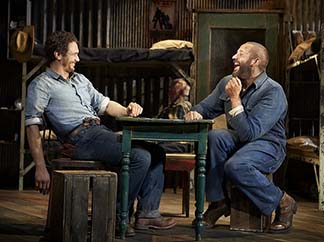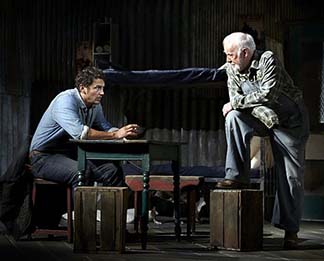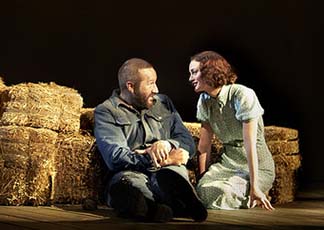By Lucy Komisar
John Steinbeck‘s play, which he adapted from his novel, is a poignant narrative about human connections among people leading lives of what is wont to be called quiet desperation.

Sensitively directed by Anna Shapiro, it tells the story of George (James Franco), a California ranch worker who in the Depression has hooked up with Lennie (Chris O‘Dowd) a mentally retarded fellow who is too strong for his own good.
They work as itinerants on farms and ranches. They stay together out of undefined affection that defeats the loneliness that would otherwise engulf them. The play was first produced on Broadway in 1937.
Franco as George is tough, strong and silent but also sad and weary. O‘Dowd‘s Lennie is big and hulking, but with a voice is that is soft and cracking. Both of them show gentle sides. They give memorable performances.
George complains how Lennie ruins his life. They have to leave the places they work, because Lennie is always getting into trouble. But Lennie giggles about them looking out for each other. It‘s Steinbeck‘s metaphor for people taking care of one another to defeat the wretchedness of lives destroyed by economic conditions.
When they arrive at a new ranch, they are directed to beds in a bunkhouse. The set by Todd Rosenthal exudes grunginess. They run into Curley (Alex Morf), the misnamed close-cropped son of the boss, who is suffused with anger and hostility. He is especially miserable, because his new wife (Leighton Meester) is tarty and flirty with the ranch workers, but pays no attention to him.

Family is missing all around. George says, “Guys like us that work on ranches is the loneliest guys in the world. They ain‘t got no family. They don‘t belong no place. They come to a ranch and work up a stake and then they go in to town and blow their stake. And then the first thing you know they‘re poundin‘ their tail on some other ranch. They ain‘t got nothin‘ to look ahead to.”
“But not us!” Lennie declares. “And why? Because… because I got you to look after me…. and you got me to look after you… and that‘s why!”
George and Lennie dream they will save to buy a farm with animals and a garden.
Candy (Jim Norton) an old man with a blind, lame sheepdog he‘s had since he was a pup, mourns when the animal is put to death by one of the ranch hands, because he is useless. Candy wants to join the imagined farm, because he is afraid he won‘t be able to get any more jobs and “I won‘t have no place to go.”

A black worker (Ron Cephas Jones) is also lonely, segregated in his own small shack. With no one to talk to, he reads books. He‘d join the farm, too.
The wife complains there are no women to talk to. Her fantasy is to get into the movies.
Will any of their dreams be realized?
Alas, Lennie’s strength is inversely proportional to his intelligence. He likes to pet animals, but handles them too roughly. That‘s the “mice.” In the end, his ill-considered acts destroy men and their dreams. It’s a metaphor. It was what the Depression did. The play is important not only for the history it tells, but because it reminds us what life is like for many people of that underclass today.
“Of Mice and Men.” Written by John Steinbeck; directed by Anna D. Shapiro. Longacre Theatre, 220 West 48th Street, New York City. Opened April 16, 2014; closes July 27, 2014. 7/17/14.

